Israeli PM Says Iran Cannot Stop Peace
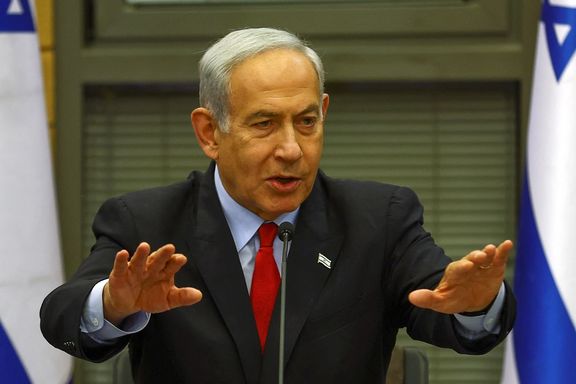
Israeli Prime Minister Benjamin Netanyahu has dismissed Iran's negative remarks about peace with Arabs, saying, "Iran will not prevent [Israel] from further expanding the circle of peace.”

Israeli Prime Minister Benjamin Netanyahu has dismissed Iran's negative remarks about peace with Arabs, saying, "Iran will not prevent [Israel] from further expanding the circle of peace.”
On Tuesday Iran’s Supreme Leader Ali Khamenei warned that governments normalizing relations with Israel would lose, following discussions on Saudi-Israel normalization with US mediation.
US Secretary of State Antony Blinken has stressed that resolving Palestinian issues is crucial for any normalization with Saudi Arabia.
Earlier on Tuesday, Iran's Supreme Leader Ali Khamenei slammed the peace efforts, stating, "The position of the Islamic Republic is that countries that make the gamble of normalization with Israel will lose. They are betting on a losing horse.”
In another comment, Khamenei said, "The Zionist regime is in decline.”
Israel's Defense Minister Yoav Gallant also responded, condemning Iran's regime for threatening peace efforts and stated, "The murderous terror regime in Iran has already succeeded in dissolving several countries it has taken over. Now it is trying to sabotage peace efforts with idle threats."
While Iran reestablished diplomatic ties with Saudi Arabia earlier this year, Iranian officials have consistently criticized Riyadh's attempts to forge relations with Israel, considering it harmful to the Palestinians.
Israeli-Saudi normalization could reshape the Middle East significantly, aligning two major US allies against Iran.
Tehran provides support to militant Palestinian groups, such as Hamas and the Islamic Jihad, which have escalated attacks against Israel and its civilians this year. These groups are part of Iran's network of proxy forces spanning from Iraq to Lebanon and Yemen, receiving both financial and military assistance from Tehran, a fact openly acknowledged by the Iranian government.

The Iranian regime has launched a campaign against Saudi Arabia after a Saudi football team refused to play while a bust of IRGC's Qassem Soleimani was on display.
The furor broke out on Monday evening when Al-Ittihad was due to play Iran's Sepahan at Esfahan's Naghsh-e-Jahan Stadium.
The Saudi team's players refused to leave their dressing-room in the standoff against Iran's move to place a bust of Soleimani in the stadium. The IRGC Quds Force general was behind the brutal Houthi militia attacks on Saudis during the years-long war, before he was killed in a US airstrike in Baghdad in 2020. Instead of playing, the team went directly to the airport and left for Saudi Arabia.
The Iranian club has announced plans to file a lawsuit against the Saudi team at the Asian Football Confederation (AFC) while Al-Ittihad blames the hosts for the cancellation of the match. A Saudi sport TV show cited an unnamed source from the club as saying that the Iranians were asked to remove the bust prior to the match.
Alireza Marzban, a former coach of Sepahan, told Iran International that following the request by the AFC to remove the statue, officials sought permission from the Office of the Supreme Leader, which did not grant permission for the removal of Soleimani’s bust. He said, "Sepahan FC tried to remove Soleimani's bust from the stadium through Esfahan’s Friday prayer Imam – Ali Khamenei's representative in the city -- and the governor, and they even contacted the Supreme Leader's office. However, all of the bodies opposed the request.”
Hours after the cancelled encounter, the municipality of the capital Tehran started installing numerous banners of Soleimani -- revered as a hero by regime hardliners -- across the city. The posters of the slain commander of the IRGC-Quds force -- designated as a terrorist group by several countries – bear the caption that reads: “They are afraid of his eyes.”
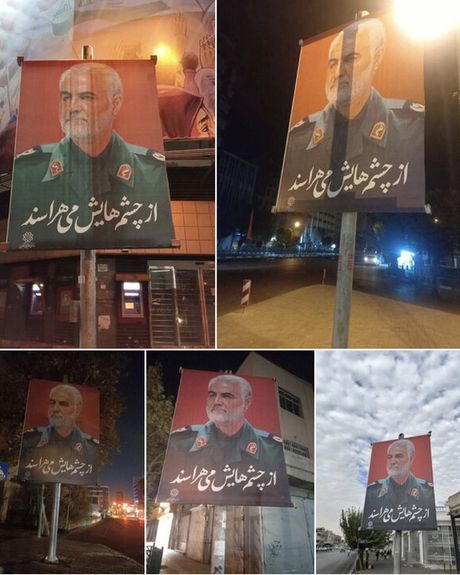
Soleimani was responsible for the actions of Iran's proxies across the region, and scores of terror attacks leading to the deaths of civilians and attacks on US targets in the Middle East.
Saudi Arabia designated Soleimani and other IRGC commanders as terrorists in 2018. The Saudis accused Soleimani and the Iranian military of attacks on Persian Gulf shipping and oil installations.
Revolutionary Guard-affiliated Fars news said the city is “adorned” with photos of the commander in response to the Saudi team's refusal to play. The IRGC Quds force is designated a terror group by several countries including the US, but to regime fanatics.
Regime propagandist Ali-Akbar Raefipour said on X (formerly twitter) that the move by Al-Ittihad players were “deliberate and pre-planned,” claiming that the symbolic move was related to the death anniversary of Saudi journalist Jamal Khashoggi. Khashoggi was allegedly murdered and dismembered inside the Saudi Arabian consulate in Istanbul in October 2018.
The drama has rocked the newly restored diplomatic ties between the two nations, which were reinstated only this year after years of standoff. In June, visiting Saudi Foreign Minister Prince Faisal bin Farhan also walked out of the room at Iran’s foreign ministry building – where a news conference was being held -- in protest to a picture of the IRGC general, the architect of proxy wars in the Middle East, including arming Yemen’s Houthis against Saudi Arabia.
Prince Faisal immediately requested the venue of the press conference to be changed and the Iranian side complied in a bid not to tarnish the newly revived relations between the two countries after years of tension which isolated the Iranian regime in the region.
The match between Al-Ittihad and Sepahan was mired in controversy even before it was called off. Videos surfaced Monday showing a large number of women denied entry to the stadium, with a police commander telling them that “women were not supposed to be let in to watch the match.” The police commander explicitly said that they had planned to allow only a cherrypicked group of women just to meet the regulations of Asian and global football authorities who have threatened to disqualify Iran if it does not allow women in the stadiums.
Among the controversies surrounding the match is how Iranian spectators reacted to the Saudi club’s symbolic move against the IRGC commander. People slammed the Iranian regime for making every aspect of life a subject of political propaganda, chanting “We do not want political football.” However, the most dominant slogans were in praise of Iran’s monarch Reza Shah, the first king of the Pahlavi dynasty. As people were leaving the stadium, they were chanting other slogans in support of monarchy in Iran. The disappointed spectators also threw garbage at the bust of Soleimani who has been idolized by the regime with streets and stadiums named after him.
Ordinary Iranians have set fire to or destroyed his statues and banners as an icon of the Islamic autocracy. In one such incident last year, Soleimani’s statue was torched hours after it was installed. On the third death anniversary of his death, people in several cities, including Tehran, Karaj, Zarinshahr, Rafsanjan, and his hometown Kerman, burned his statues and posters. Despite the Islamic Republic’s propaganda to portray Soleimani as a national hero, many people believe he was guilty of spreading violence in the region and repression at home.
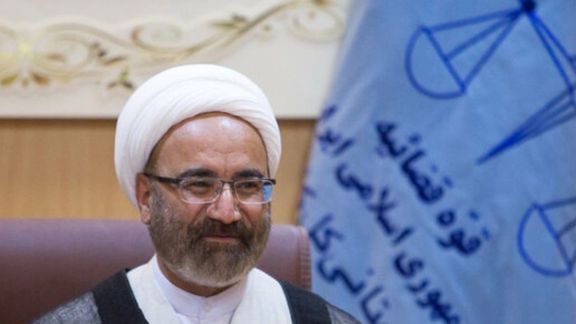
Two sons of Iran's first deputy head of the Judiciary are involved in a $400 million money laundering and corruption case.
The sons of Mohammad Mosaddegh are facing a range of allegations, including the formation of a corruption network, money laundering, forgery of documents, and interference in judicial cases.
The news of the detention of his two sons, who have been confirmed as participants in this network, has recently come to light. Their apprehension follows the arrest of an individual approximately eight months ago, charged with smuggling, money laundering, and other infractions.
According to the IRGC-affiliated Tasnim News Agency, under the directive of the Chief Justice, an investigation was initiated, leading to the detention of eight individuals connected to the case so far.
In July 2021, shortly after Mohammad Mosaddegh assumed the role of first deputy head in the Judiciary, his two sons were implicated in the network. Mosaddegh, a clergyman born in Tabriz, has held various high-ranking judicial positions during his career.
During his tenure, Mosaddegh was ironically advocating judicial reforms. He made efforts to bolster his image for an anticipated presidential candidacy by launching media campaigns to showcase the changes and advancements within the judiciary.
In a previous case, another senior judiciary official, Akbar Tabari, was arrested in 2019 for leading a bribery network and personally accepting multiple bribes. He was sentenced to 31 years in prison.
Transparency International ranked Iran as the 150th out of 180 countries in its 2021 Corruption Perception Index, categorizing it as one of the world's most corrupt nations.
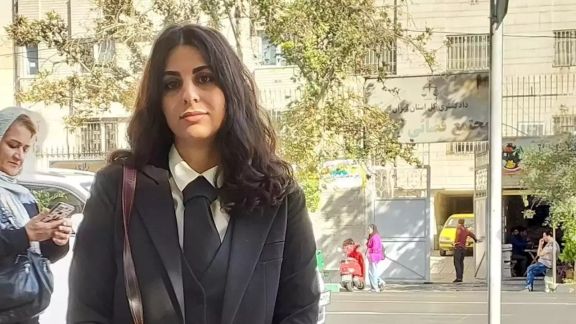
Anti-hijab ex-detainee Sepideh Rashno was denied presence at her own trial in Tehran after announcing on social media that she would not wear the hijab at the court.
In a brief statement, the judiciary said Rashno’s trial was held Monday morning. The statement published by the judiciary’s news agency, said Rashno was “absent” at the trial, so her defense was presented by her attorney. The Revolutionary Guards (IRGC) linked Fars news agency said Rashno has not made any comments about being refused presence at her own trial yet.
The artist, writer and editor who will turn 29 in a couple of weeks published a photo of herself with her hair uncovered on Instagram before attending the court Monday morning and said she was going to show up at the court to defend herself against the charges wearing the same clothing.
“[I will attend the trial] to defend myself for crimes that I have not committed, to defend the right to choose one’s clothing and [the right] to write about the things that have happened to me, to defend the right to be a woman, …,” Rashno said in her post.
“I know my family will lose their peace and come under various pressures from all sides but I know that the picture that you see is the truth and have no other choice than being committed to the truth,” she added.

Rashno was arrested on July 16, 2022, after a video of her quarrel with a woman verbally assaulting her for being unveiled on public transport went viral. She was later tortured into televised denunciation of her own actions and expressing regret for the quarrel. Even in the “confession” video her face was bruised showing signs of torture. She was released from Tehran’s Evin prison after about 40 days with a bail of about $27,000, a huge sum for ordinary Iranians.
The young activist was found guilty of “association and collusion with the intention of committing a crime against the country's security" and “propaganda against the Islamic Republic” and given a five-year suspended jail sentence in December but was charged again with “promoting moral corruption” and “propaganda against the regime” after posting an unveiled photo on social media.
She was also suspended for two terms by her university. "As a citizen, I have the right to choose the clothes I wear,” she wrote in response to the decision, adding that she plans to return to the university after her suspension with “her preferred outfit.”
A little over a year later, and after months of nationwide protests following the death of Mahsa Amini in the custody of the morality police, many more women of all ages have found the courage to publicly defy the compulsory hijab rules to the point that in many places being veiled looks stranger than being unveiled, people in Iran say.
Since the beginning of the new academic year last week, authorities have taken tougher measures to enforce the hijab rules in some universities including the use of facial recognition software. Students’ reports on social media indicate continued defiance despite the pressures and threats.
Stricter measures to enforce the hijab are being employed in other public arenas too including denying unveiled women entry to public transport. On Sunday a sixteen-year-old woman in Tehran lost consciousness when her head hit a pole following a dispute over her hijab with hijab enforcers who shoved her against a pole.
Shargh daily has reported that Maryam Lotfi, one of its reporters who followed the victim to the hospital to report the incident, has been arrested.
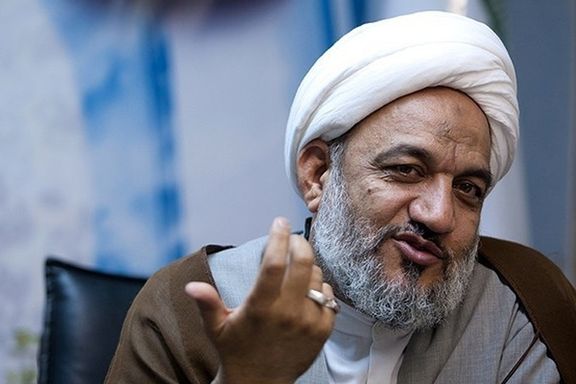
An Iranian MP has announced the allocation of over 20,000 hectares of land, with plans to allocate an additional 10,000 hectares to encourage childbirth.
Morteza Aghatehrani, the chairman of the Parliament's Cultural Committee, disclosed that as part of the population growth and childbirth support program, 200,000 cars have also been provided to eligible individuals. However, he did not specify the recipients of the allocations, raising questions about whether they were distributed fairly or exclusively to loyalists.
Amidst the widespread economic challenges that leave many struggling to make ends meet, Aghatehrani voiced apprehensions regarding the declining population trend, emphasizing that people frequently underestimate its importance.
Iran's population is shifting from a youthful demographic to an aging one, which poses challenges for the future. In recent decades, Iran has witnessed a steady decline in childbirth rates, with the population growth rate dropping from 4.8 percent in the early 1980s to below one percent in recent years.
Supreme Leader Ali Khamenei considers efforts to increase Iran's population as a top priority and essential policy for the Islamic Republic, given its position as a leading Shia country in the Muslim world.
Responding to Khamenei's call, the parliament, which is predominantly composed of hardliners, passed a law in March 2022 mandating state entities to actively promote marriage and childbirth. The law also banned public health services from providing family planning options.
Critics of the population increase policy argue that the Islamic Republic has failed to improve living standards, with figures indicating that nearly 50 percent of the population lives below the poverty line. Many others continue to face increasing economic hardships despite holding multiple jobs.
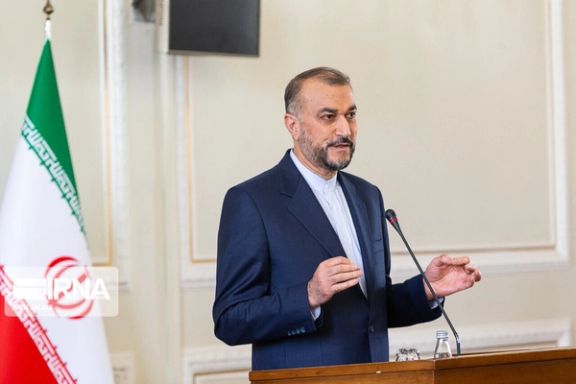
The Iranian Foreign Minister claims the US called for immediate deescalation after its airstrike which killed Quds Force commander Qasem Soleimani.
Hossein Amir-Abdollahian claimed that Washington sent a message calling for calm, in addition to claiming the US had made several offers following the death of Soleimani, suggesting that if the Islamic Republic did not react, some sanctions would be lifted.
However, it is unclear why the revelations are being made now since this has never been stated by Iranian officials before, and there have been no previous indications of it from either side to corroborate the latest claims.
Soleimani was killed in a US drone strike near Baghdad International Airport in 2020 on the orders of then-President Donald Trump, who said that the top military commander was actively planning attacks on American diplomats and service members in the region in addition to members of the administration.
Five days after Soleimani's death, Iran launched ballistic missiles at the Iraqi base hosting US troops. While no Americans were killed, there were reports of dozens of servicemen suffering concussion due to the powerful explosions.Since then, the Islamic Republic has maintained its threats of revenge for Soleimani including at a recent speech given by the Iranian president at the United Nations General Assembly.
Plots were discovered in the United States aimed at assassinating former US National Security Advisor John Bolton and former Secretary of State Mike Pompeo.